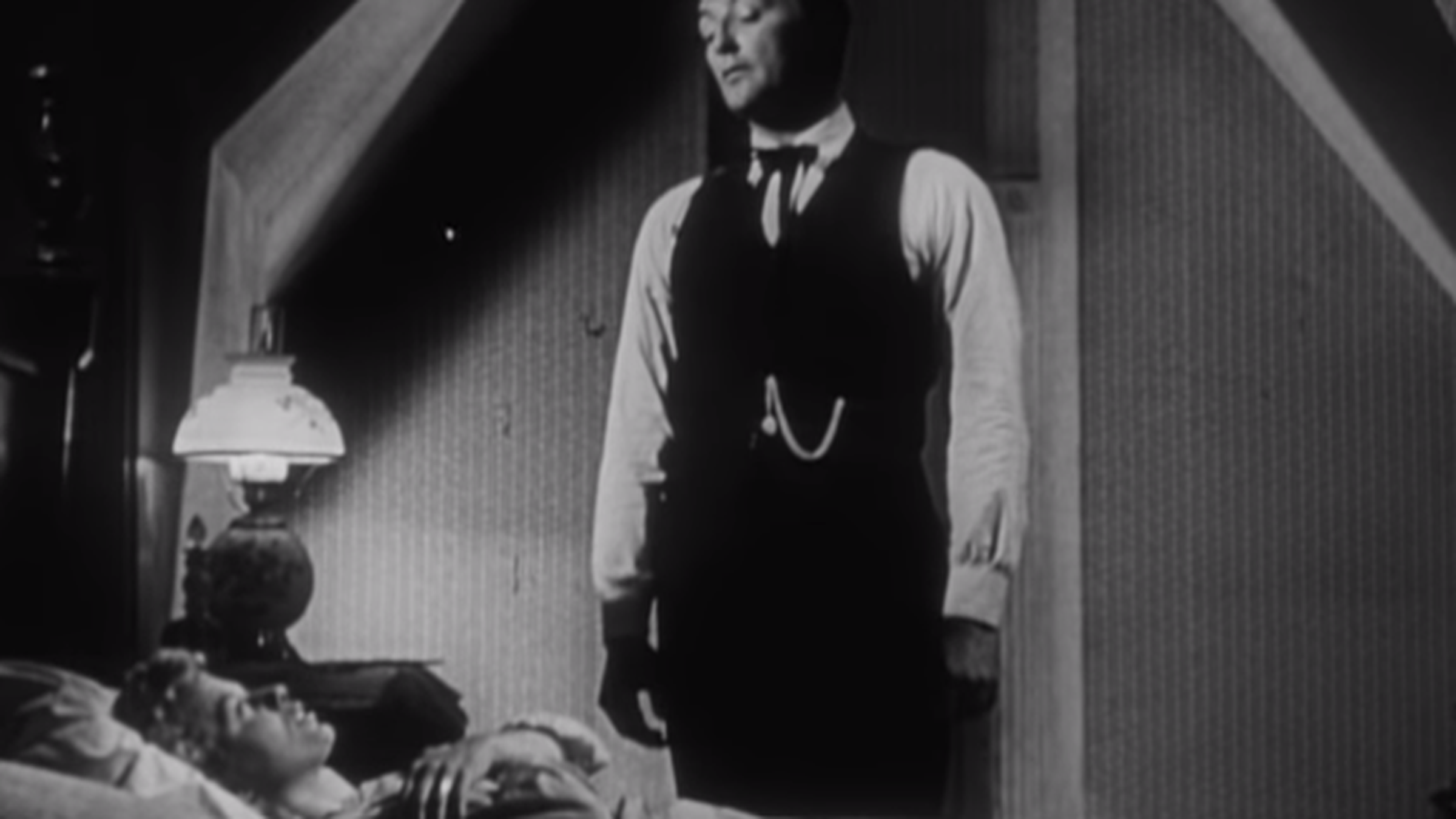Inspired by the readings for each Sunday in Lent, Your Humble Scribe selected six movies for families to consider for Sunday afternoon viewing and discussion. Readers may find some of my selections … um … surprising, if not entirely unknown.
For the first Sunday of Lent, St. Luke tells of Jesus being tempted by the devil. The contrast of choosing the perishable things of the world with choosing the imperishable, sacrificial love God has for us, I was reminded of The Night of the Hunter (1955). Based on a powerful, bestselling novel by Davis Grubb, the movie’s director, Charles Laughton, described it as “[A] nightmarish sort of Mother Goose tale.”
The movie flopped at the box office but became a staple on TV. By 1967, now in college, I found several books in which film critics, having reanalyzed the film’s art, lyricism and dark beauty, proclaimed it a powerful cautionary tale. Some declared it second only to Citizen Kane as a cinematic masterpiece. Across the ensuing decades this film continues to garner critical praise.
The story opens with a grandmotherly woman (silent star Lillian Gish) in a Sunday school setting warning children, “A good tree cannot bring forth evil fruit. Neither can a corrupt tree bring forth good fruit. Wherefore by their fruit shall ye know them” (Matthew 7:18).
The scene shifts to “Preacher” Harry Powell (Robert Mitchum) driving a stolen car in West Virginia during the Great Depression. He is a Calvinistic psychopath professing, “The religion the Almighty and me worked out betwixt us.” LOVE and HATE tattooed on his knuckles illustrate a well-rehearsed parable, a warning against the novelties of sectarianism. For Powell marries then murders “widders” to gain their “little wad of money hid in the cookie jar.” Harry blasphemously justifies this to God: “Not that You mind the killin’s. Your book is fulla killin’s.”
Preacher hits the jackpot when he marries Willa (Shelley Winters), widow of Ben Harper (Peter Graves), a bank robber, believing their little children, John and Pearl, know where Ben hid $10,000. When all their adult friends fail to protect them, the children flee. They are finally rescued and protected by the tough old lady we saw at the beginning, who proves to follow the real Christianity which Harry Powell parodied and perverted.
The Night of the Hunter was selected for preservation by the National Film Registry in 1992. A superb synopsis of this movie “Charles Laughton, The Night of the Hunter (1955)” by Norman N. Holland, will be found online.
The second Sunday of Lent features St. Paul writing, “For many … conduct themselves as enemies of the cross of Christ … Their minds are occupied with earthly things. But our citizenship is in heaven (Philippians 3:17; 4:1). It caused me to think of Groundhog Day (1993).
A great deal of ink has been spilled describing the screenplay by Danny Rubin and Harold Ramis as representing Buddhist, Jewish or Catholic beliefs. As is well-known, Phil Connor, a cynical, post-modernistic Everyman, lives the same day over and over as “an enemy of the cross” taking advantage of having no consequences for his actions until he discovers love of God and neighbor on his way to citizenship in heaven. It is particularly gratifying to realize that Phil and Rita waken at the end, in bed together, but wearing the same clothing they fell asleep in.
The movie entered the National Film Registry in 2006. You might wish to prepare by reading “Phil’s Shadow on the Lessons of Groundhog Day” by Michael P. Foley.
The Gospel for the third Sunday of Lent recounts the parable of the fig tree, which the owner wants to cut down since it produces no fruit. His gardener replies, “Sir, leave it for this year also, and I shall cultivate the ground around it and fertilize it; so it may bear fruit in the future. If not you can cut it down’” (Luke 13:9).
Born in Italy in 1603, Giuseppe Desa was not the sharpest knife in the drawer. As a boy he struggled at his studies. He failed to learn a trade. Like the fig tree of the parable, Giuseppe brought forth no fruit. He loved animals, however, and his mother at last prevailed on her brother, a priest in the Franciscan order, to have Giuseppe admitted as a lay brother to care for the stables.
The Reluctant Saint (1962) tells of St. Joseph of Cupertino who, to paraphrase Jesus, was as simple as a dove — and as hapless as Laurel and Hardy. Traditional Franciscan accounts agree that he was "remarkably unclever." Still, he loved Jesus greatly. So much so, as he celebrated Mass, he was seen by many to levitate and float in ecstasy above the altar. He is known as the “Flying Friar.”
Maximillian Schell won the Oscar as Best Actor in 1961 for his role as the erudite German attorney in Judgement at Nuremberg. He displays his versatility as the gentle, “unclever” Giuseppe. Ricardo Montalban as his nemesis Don Raspi, Lea Padovani as his exasperated mother, and Akim Tamiroff as a friendly bishop are much appreciated presences in this sadly neglected example of comedic hagiography written, produced and directed by the famed Edward Dmytryk.
More information about Saint Joseph will be found the Catholic Encyclopedia.
Student’s prayer: O Holy Spirit, glorious Seat of Divine Wisdom, enlighten me! And, lost in my studies, O blest Saint Joseph of Cupertino, pray for me that I remain within the gentle love of the Sacred Heart of Jesus. Amen. Sept. 18 is St. Joseph of Cupertino’s feast day.
Part 2 of “Movies for Lent” will be found in the next installment.
Sean M. Wright, MA, award-winning journalist, Emmy nominee, and Master Catechist for the Archdiocese of Los Angeles, is a parishioner at Our Lady of Perpetual Help in Santa Clarita. he responds to comments at [email protected].












